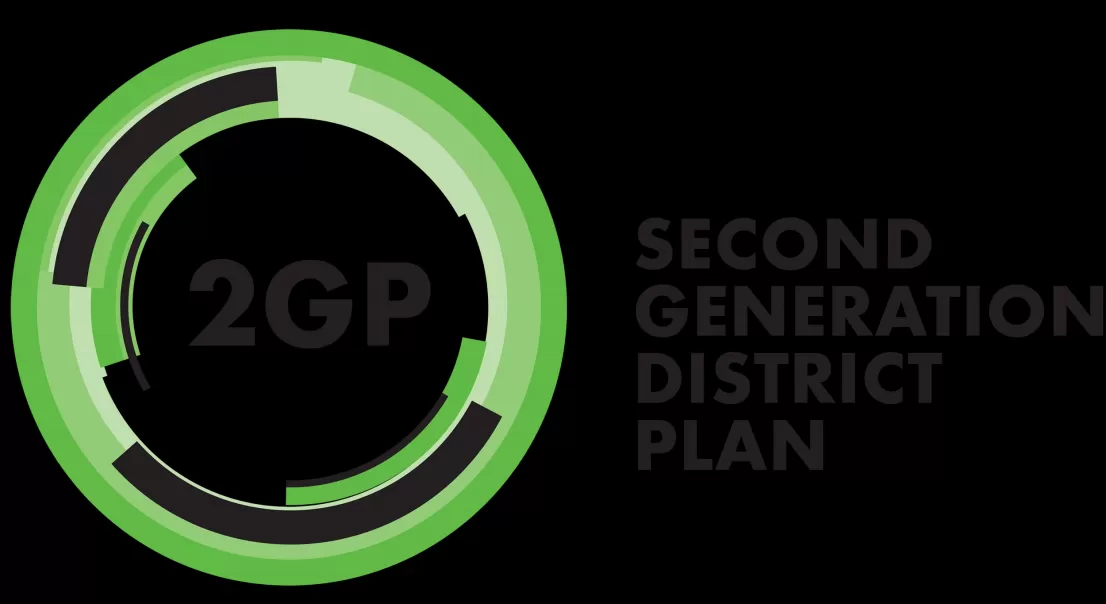What is a District Plan?
The Dunedin City District Plan controls what people can do on their land and how it can be developed. It includes objectives, policies and rules. The main goal of the District Plan is to sustainably manage the natural and physical resources of Dunedin to meet the needs of current and future generations and to provide for their social, economic and cultural wellbeing and for their health and safety.
What is the 2GP?
Under the Resource Management Act 1991, the DCC is required to review the District Plan every 10 years. The current operative District Plan was first released in 1995 and became fully operative in 2006. A full review of the operative Plan was started in 2012. This review produced the Proposed Second Generation Dunedin City District Plan, known as the 2GP. The 2GP is an entirely new plan, with a new format, new zones, new objectives and policies, and many changes to the rules.
The 2GP was notified on 26 September 2015 and was open to formal submissions and further submissions. Public hearings were held from May 2016 to December 2017, where the 2GP Hearings Panel heard from DCC planners, submitters, lawyers and technical experts.
The decisions are now incorporated into the 2GP (decisions version) November 2018.
On 19 August 2024 the 2GP was made partially operative except for some site-specific appeals and associated provisions.
The 2GP process map


Stage 1 – Plan development
As part of developing the 2GP, there was community consultation on:
- issues and options (November 2012 - March 2013)
- preferred options (August 2013 - September 2013 and June 2014 - September 2014 for natural hazard provisions).
Issues and options
The issues and options information presented the public with a range of issues related to the current District Plan and asked people how they would like to see these issues resolved. They could also offer any other feedback.
2GP Preferred Options Consultation Phase Report (City Development, February 2014)
Preferred options
The purpose of the preferred options phase was to collect feedback on the goals and proposed changes for the reviewed sections of the 2GP, including preferred options for zone boundaries and rules. Overall, there was general support for the issues identified and the general direction of changes, as well as additional ideas and suggestions.
Based on the preferred options, more detailed work was completed to identify zone boundaries, the status of activities in different zones and specific rules in relation to performance standards and other rules.
Throughout the entire plan development process, there was also informal consultation with key stakeholders, organisations and individuals, as well as review and feedback from reference groups as part of the drafting phase.
2GP Issues and Options Consultation Phase Report (City Development, October 2013)
Stage 2 – Submissions
Initial submissions
The initial submissions period ran from 26 September to 24 November 2015. Anyone was able to make a formal submission. There were some statutory restrictions around submissions which related to trade competition. Late submissions received prior to 3 March 2016 were accepted.
Further submissions
The further submissions period ran from 10 February to 3 March 2016, with late further submissions allowed on four original submission points.
The process allowed some people to submit on whether they supported or opposed a point raised in a submission. The RMA limits the people who could take part in this process to:
- any person representing a relevant aspect of the public interest
- any person that has an interest in the plan greater than that of the general public
- the DCC.
Stages 3 and 4 – Hearings and deliberations
Public hearings were held from May 2016 to December 2017, where the 2GP Hearings Panel heard from DCC planners (reporting officers), submitters, lawyers and technical experts.
During the hearing, members of the Hearing Panel could ask a submitter or other presenters questions about their submission, their statement or their evidence. At the end of the submitters’ presentations, the DCC planner was given the chance to respond to the presentation and change any recommendations in their report.
After everyone had spoken, the Panel adjourned the hearings and then met to discuss the issues before reaching a decision. In some cases where the Panel required extra information, it reconvened hearings to hear more information from submitters or asked DCC staff to provide further information. This material can be found on the hearing schedule pages.
Stage 5 - Decisions
In the case of designations, the Panel made recommendations on designations requested by non-DCC requiring authorities and decisions on DCC designations. For all other District Plan matters, decisions were not made after each individual hearing, but after several hearings. This is because topics overlap, and all matters must be covered before a decision can be made. That meant decisions were not released until the end of all the hearings, when the Panel was satisfied no further hearings were needed.
On 17 October 2017, the DCC’s Planning and Environment Committee approved a one-year extension for decisions on the 2GP to be released. On 28 August 2018 the Council approved an extension until 16 November 2018.
Decisions were written up into 29 reports, based on hearing topics. Submitters were served notice by mail that decisions were released and the public was notified via a public notice.
Stage 6 - Appeals
Any submitter not satisfied with the decision on their submission has the right to appeal the decision to the Environment Court. Submitters can appeal decisions on any parts of the plan that they submitted on. Appeals are heard by the Environment Court.
Information about the status of the 2GP rules and how they apply can be found on the Read the Plan page.
Sign up to City Development News
If you would like to be kept up to date on the 2GP process, the status of appeals and City Development projects please subscribe to our City Development News.
